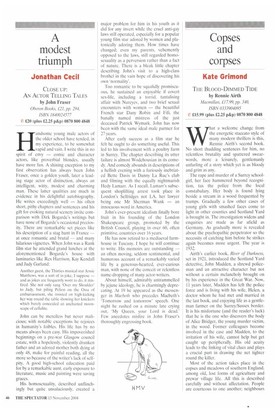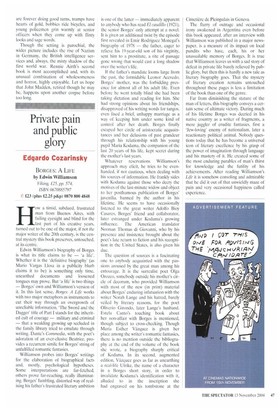Copses and corpses
Kate Grimond
THE BLOOD-DIMMED TIDE by Rennie Airth
Macmillan, £1799, pp. 340, ISBN 0333904095 £15.99 (plus £2.25 p&p) 0870 800 4848
What a welcome change from the energetic staccato style of many modern thrillers is this, Rennie Airth's second book. No short thudding sentences for him, no relentless brutality and spattered swearwords, more a leisurely, gentlemanly unfurling of a story which yet is as bloody and grim as any.
The rape and murder of a Surrey schoolgirl, her face hammered beyond recognition, tax the police from the local constabulary. Her body is found lying beside a stream in a wood frequented by tramps. Gradually a few other cases of young girls with smashed faces come to light in other counties and Scotland Yard is brought in. The investigation widens and enquiries are made as far afield as Germany. As gradually more is revealed about the psychopathic perpetrator so the necessity of catching him before he strikes again becomes more urgent. The year is 1932.
Airth's earlier book, River of Darkness, set in 1921, introduced the Scotland Yard detective, John Madden, a shrewd policeman and an attractive character but not without a certain melancholy brought on by his experience in the Great War. Now, 11 years later, Madden has left the police force and is living with his wife, Helen, a doctor whom he had met and married in the last book, and enjoying life as a gentleman farmer on the Surrey/Sussex border. It is his misfortune (and the reader's luck) that he is the one who discovers the body of Alice Bridger, the young murder victim, in the wood. Former colleagues become involved in the case and Madden, to the irritation of his wife, cannot help but get caught up peripherally. His old acuity leads to the linking of vital clues and plays a crucial part in drawing the net tighter round the killer.
Most of the action takes place in the copses and meadows of southern England, among old, lost forms of agriculture and prewar village life. All this is described carefully and without affectation. People are courteous to one another; neighbours are forever doing good turns, tramps have hearts of gold, bobbies ride bicycles, and young policemen grin warmly at senior officers when they come up with flinty looks and sage words. Though the setting is parochial, the wider picture includes the rise of Nazism in Germany, the British intelligence services and, always, the misty shadow of the first world war. Rennie Airth's second book is most accomplished and, with its unusual combination of wholesomeness and horror, highly enjoyable. Let us hope that John Madden, retired though he may be, happens upon another corpse before too long.



























































































 Previous page
Previous page